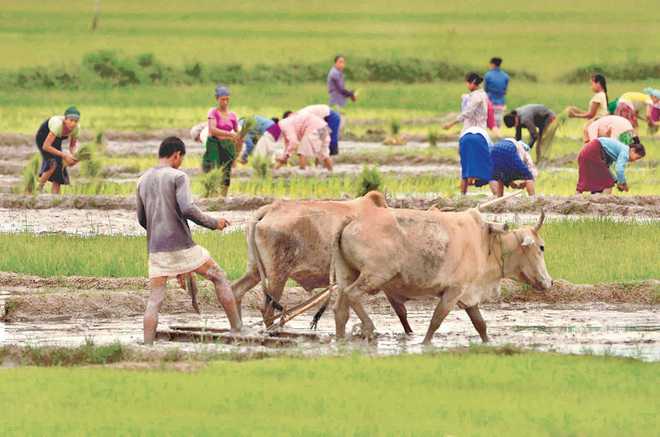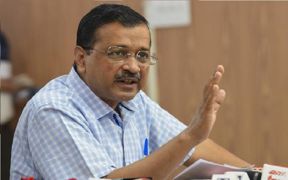
Kiran Vissa & Yogendra Yadav
Kiran Vissa & Yogendra Yadav
Social activists, working on issues of farmers
THE Economic Survey of 2018 has acknowledged that the real income of the farmers has remained stagnant in the past four years. It takes note of the present crisis: despite lower sowing in key crops, prices have fallen below the official minimum support price (MSP) and alerts that in the 'medium term', the situation could worsen: farmers' income could shrink from 16 to 25 per cent due to higher temperature and lower rainfall.
On the eve of the Union Budget, the government has been trying to bury the issue of farmers' income under statistics on production.
a) First, the government needs to fix the flaws in the cost estimates already documented by government committees.
b) The second is the implementation of the BJP's election promise of providing MSP at 50 per cent margin above the cost of production.
c) Third, expand the MSP system from the present 24 to more crops.
d) Most importantly, guarantee that the declared MSP actually reaches the farmers.
We do not know how Mr Jaitley would respond to the challenge underlined by the Economic Survey and farmers' organisations. But we can ask and answer the basic questions: Is this demand justified? Can this be implemented?
The government does not treat farming as any other occupation — as it repeatedly intervenes to keep the prices of food and raw materials low. In return, it is expected to look after the farmers. Since the 1960s, an unwritten compact has prevailed: the farmer will produce more and more, and the government will ensure that the farmers get sufficient returns and continue to produce. The policies of MSP, procurement and market intervention were all part of this compact.
The policy of MSP
There is an overwhelming evidence to suggest that the government has broken this compact.
1 Firstly, the MSP is less than the officially determined cost of production (C2) for many crops, let alone provide 50 per cent returns. The MSP offered for kharif 2017-18, for example, was less than the cost of production in seven out of 14 crops. Further, even these C2 figures are underestimates, as the Ramesh Chand committee has shown.
2 Secondly, even this flawed MSP is not being delivered to the farmer. An analysis of the prices in November 2017 shows that in seven out of eight major crops, the average APMC market prices are significantly below MSP. Maize was selling at Rs 1,162 (MSP Rs 1, 425) and paddy for Rs 1,431 (MSP Rs 1,550). These are the official figures. The actual price obtained by the farmer was significantly lower. Our calculations show that the farmers lost as much as Rs 32,702 crors in this kharif season due to the shortfall from the official MSP.
If we go by the BJP's electoral promise, ie, MSP at C2 + 50 per cent, the deficit is Rs 2.01 lakh crore. This is in effect the revenue foregone by the farmers because they were not getting the fair price as promised during the elections and recommended by the National Farmers' Commission. In other words, this was a subsidy given by farmers to the nation. It is clear that bearing this recurring loss (termed 'kisan ki loot' by farmers' movements) is breaking the back of the farming community of India. That is why the original compact must be restored and the government must step in to ensure fair prices.
Is this feasible?
The measures sought by the farmers — such as making MSP a legal right and the floor price for all market auctions, effective procurement and market intervention, penal action against purchases below MSP, compensation to farmer for failure to ensure MSP — are all feasible and are being implemented in other countries and parts of India. In fact, the CACP itself in its kharif 2017-18 report called for "a legislation conferring on the farmers 'The Right to Sell at MSP'."
Can the country afford it?
While the total deficit faced by farmers compared to C2+50 per cent is Rs 2 lakh crores, effective market intervention and procurement needs to cover only a part of it — sufficient to ensure that the market prices rise to the desired level. Besides FCI procurement, other means of procurement in case of tur dal in Maharashtra and Telangana, and through women's SHGs in case of maize in Telangana and AP, have proved successful.
Also the total agricultural subsidy (including food subsidy meant for poor consumers) is about 16 per cent of agricultural GDP, compared to 24 per cent in China and 38 per cent in the US. Besides, if banks can be given Rs 2 lakh crore to help write off corporate NPAs and Rs 1 lakh crore is the annual additional expenditure to implement the Seventh Pay Commission, surely enough allocation can be made to ensure a better value for produce by our ann daatas. Allocating adequate funds to ensure decent livelihood for 54 per cent of the population is a matter of political will.
What about the increase in food prices?
That is a valid concern, but it cannot override everything else. The government not the farmer has to bear the burden of providing cheap food to the needy. The fact is that farmers' crop prices have been suppressed for decades and call for urgent correction in the same way as the historic increase in the minimum wages for labour. The remunerative MSP would also be lower if input costs are reduced through subsidies, promotion of low-cost sustainable practices and regulation of input prices.
Would it distort international trade?
The argument that if the prices of agricultural products rise, the Indian industry would start sourcing cheaper material through imports is overstated. It is time to change the anti-farmer bias of international trade policy and make it an instrument to support Indian farmers. Domestic consumption is by far the major market for Indian agriculture, especially for food products. If farmers get better, remunerative prices in India, then export is not a priority for them. We have the powers to place reasonable restrictions on import to protect our farmers' prices.



























